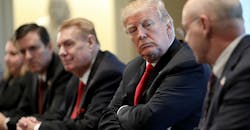Canada, Mexico to Get Initial Exemption From Trump Tariffs
The Trump administration will initially exclude Canada and Mexico from stiff tariffs on steel and aluminum imports, an exemption they would lose if they fail to reach an updated NAFTA agreement with the U.S., White House trade adviser Peter Navarro said on Wednesday.
The two nations won’t be subject to tariffs on their steel and aluminum if they sign a new North American Free Trade Agreement that meets the satisfaction of the U.S., Navarro said, adding that other American allies could use a similar system to ask for an exemption.
If NAFTA talks fall through, Canada and Mexico would face the same tariff as other nations, expected to be 25% on steel and 10% on aluminum.
“Here’s the situation, and the president has made this public," Navarro said. "There’s going to be a provision which will exclude Canada and Mexico until the NAFTA thing is concluded one way or another."
The decision-making process regarding the tariffs has evolved and more changes could be made before President Donald Trump formally approves them. China on Thursday vowed to retaliate, its most forceful comments yet on the threatened tariffs.
China Response
“A trade war is never the right solution,” China’s Foreign Minister Wang Yi told reporters in Beijing. “In a globalized world, it is particularly unhelpful, as it will harm both the initiator and the target countries. In the event of a trade war, China will make a justified and necessary response.”
Earlier Wednesday, White House Press Secretary Sarah Huckabee Sanders said the tariff plan would feature “potential carve outs for Canada and Mexico based on national security” considerations and also possible exclusions for specific countries.
Australia is among those making the case for exemption, with Foreign Minister Julie Bishop citing her nation’s status as a "close ally and partner" in a Sky News interview on Thursday.
'Encouraging'
“While the news is encouraging, our efforts are ongoing,” Trade Minister Steven Ciobo said in a reply to emailed questions on Thursday about Huckabee Sanders’ comments. “We are leaving no stone unturned to secure Australian exports and the jobs they support.”
Negotiators from the U.S., Canada and Mexico wrapped up the seventh round of NAFTA talks this week in Mexico still hoping for a breakthrough on the biggest sticking points. The president hinted at the tariff incentive in a tweet earlier this week, without elaborating on how the trade-off would work.
Trump’s plan to impose tariffs on aluminum and steel triggered threats of retaliation from trading partners including Canada, Mexico and the European Union. Lawmakers of his own Republican Party have been turning up the pressure, warning of severe political and economic ramifications and the potential for a trade war from such broad-based measures.
Navarro, the director of the Office of Trade and Manufacturing Policy, said in an interview with the Fox Business Network on Wednesday evening that Trump would sign the tariff proclamations on Thursday at 3:30 p.m. in the Oval Office surrounded by workers in the steel and aluminum industry.
EU Retaliation
But a person familiar with the planning said that the president would likely not sign on Thursday because lawyers needed more time to polish the details and finish the paperwork. The White House schedule released late Wednesday didn’t list a tariff announcement for Thursday.
The threat of retaliation over the tariffs, which the International Monetary Fund has warned could eventually damage growth, is already rising. Besides China, the European Union has said it would respond with its own 25% tariff to hit $3.5 billion of American goods. The bloc is targeting iconic U.S. brands produced in key Republican states on a range of consumer, agricultural and steel products, according to a list drawn up by the European Commission.
Treasury Secretary Steven Mnuchin, in an interview on Wednesday, said he recognizes the risk of retaliation against the U.S. for steel and aluminum tariffs but he still believes the move will benefit American workers.
“We are the freest trader in the world, hands down,” Navarro told Bloomberg TV on Wednesday. “All we get for that is a half a trillion dollar a year trade deficit that offshores our wealth, offshores our jobs.”
By Jennifer Jacobs, Andrew Mayeda and Toluse Olorunnipa
About the Author
Bloomberg
Licensed content from Bloomberg, copyright 2016.
